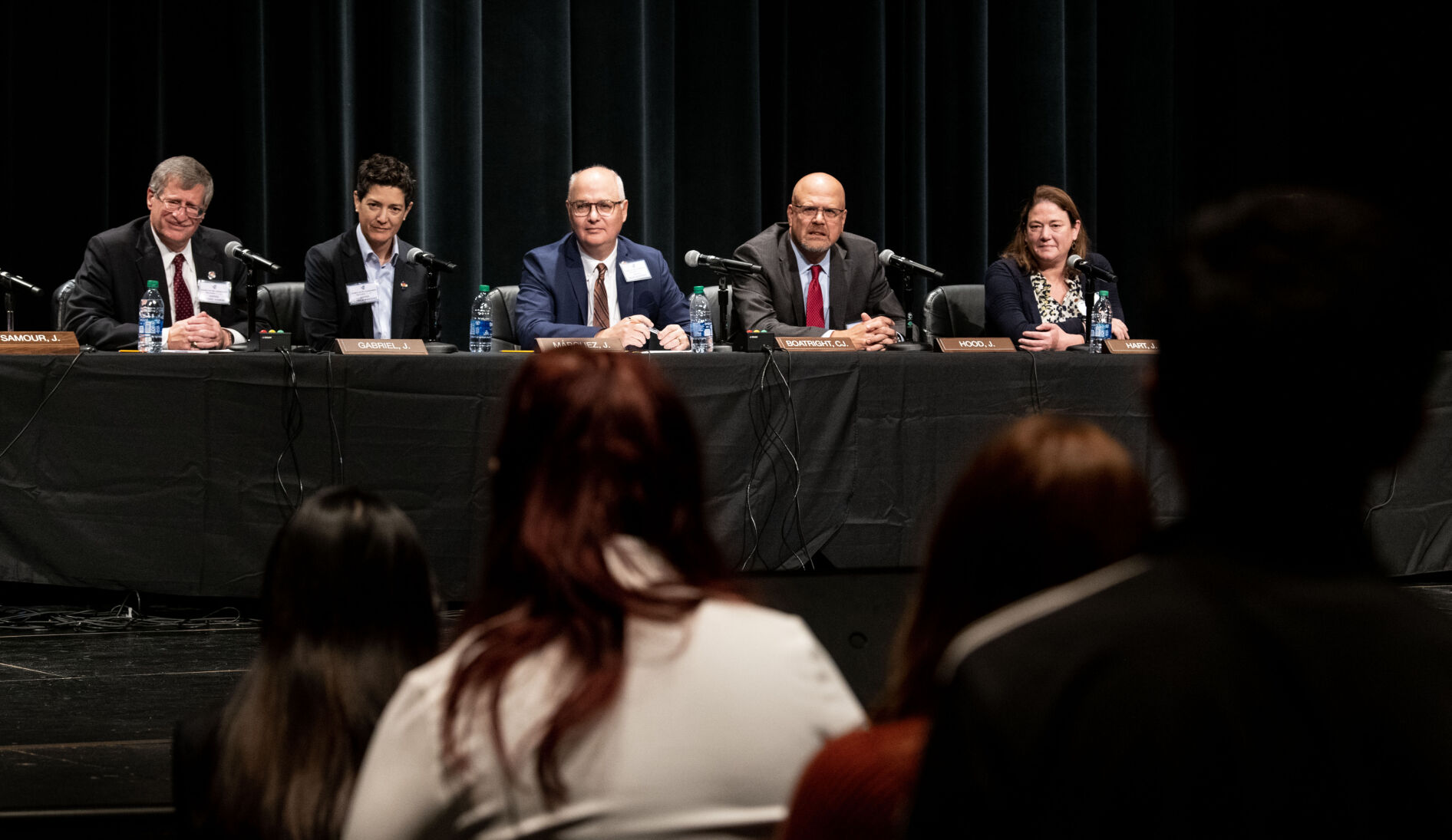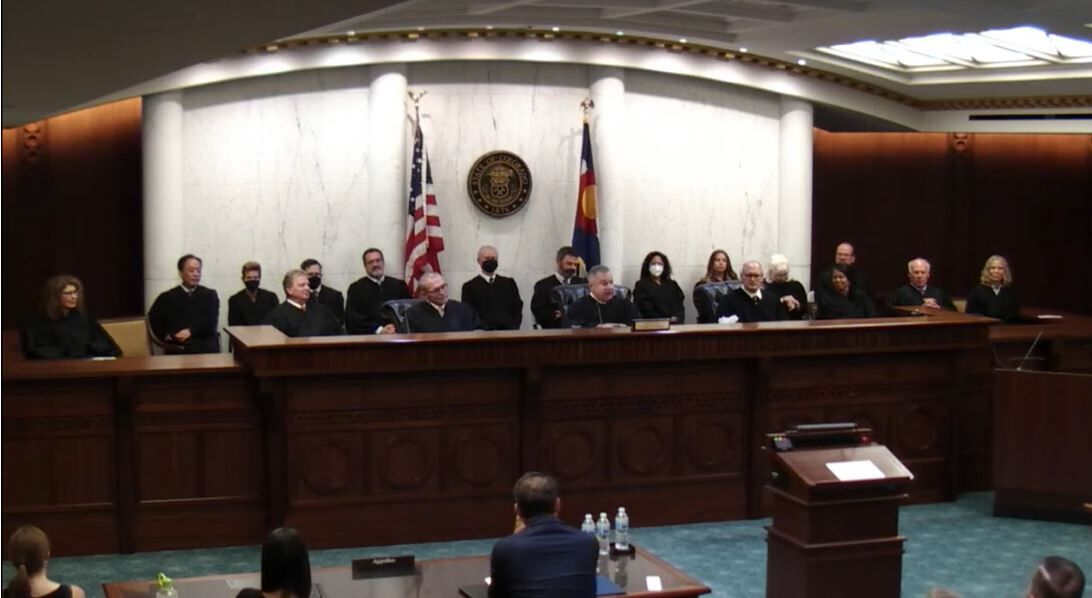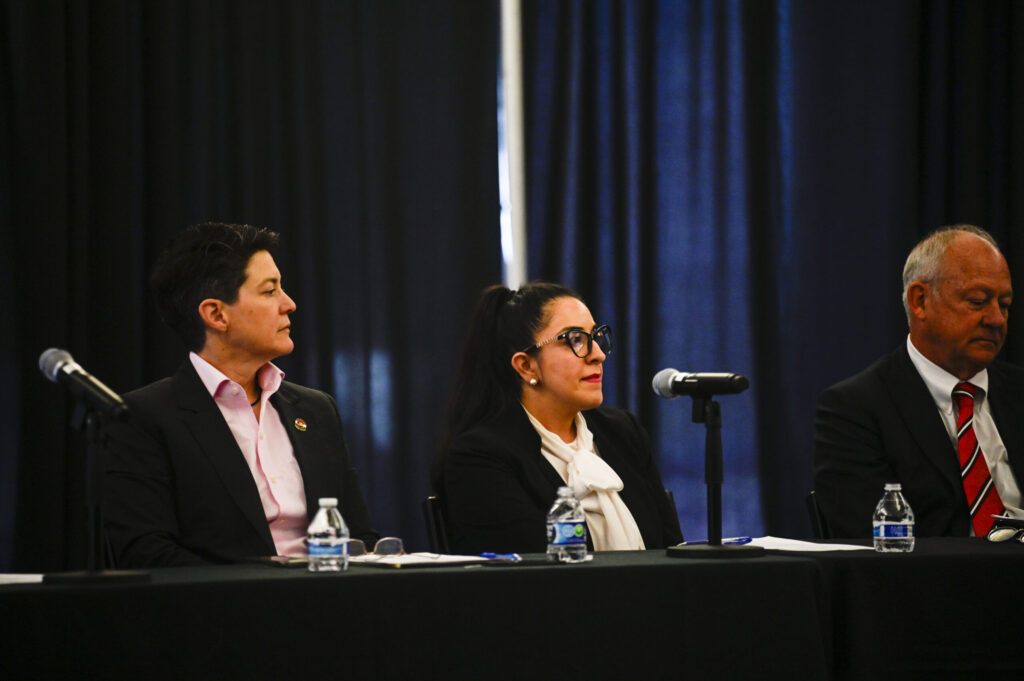Colorado Supreme Court to hear cases on identity theft, child prostitution

The Colorado Supreme Court announced on Monday that it will review two criminal appeals, one questioning the level of proof needed to convict a man for trying to prostitute a child and the other addressing whether an organization can be the victim of identity theft.
At least three of the court’s seven members must consent to hear a case on appeal.
The justices also signaled they might intervene in a criminal prosecution out of Denver, where a trial judge ruled the state’s law permitting deadly force against home intruders did not apply to a defendant who shot a man on his porch.
Finally, the Supreme Court narrowly turned down a fourth case out of Pueblo, in which the state’s Court of Appeals previously found a man convicted of a sex offense did not have to incriminate himself and accept responsibility while he was still challenging his conviction.
A matter of intent
An Arapahoe County sheriff’s employee posed as a teenage girl on a social networking platform for people 18 and older. Deshawn Lynn Randolph came across the girl’s profile and began messaging, then texting, her. He asked if she was “down to get naked” and said he had “money lined up for you” to have sex.
The girl, “Nicole,” disclosed she was a few days shy of turning 18. Although Randolph and Nicole never actually met as planned, police eventually went to Randolph’s job and arrested him. A jury convicted him of soliciting for child prostitution and he received nine years in prison.
On appeal, Randolph challenged whether the prosecution had proven its case.
Under the law, Randolph was guilty if he induced someone “for the purpose” of child prostitution, or if he arranged a meeting “for the purpose” of prostitution. Randolph’s trial judge believed prosecutors only needed to prove Randolph acted “knowingly” in soliciting Nicole, not that he specifically intended to prostitute her.
However, the day after trial ended, the Court of Appeals handed down a decision in another case finding prosecutors do need to prove a specific intent to prostitute. Because decisions of the Court of Appeals are not binding on each other, the three-judge panel that heard Randolph’s case opted against following their colleagues’ opinion.
Consequently, it was enough for prosecutors to show Randolph acted knowingly, meaning he understood the likely outcome of his conduct.
Randolph appealed to the Supreme Court, arguing the justices should address the competing decisions of the appellate court and adopt the higher threshold for conviction. Under that test, Randolph would have potentially avoided a guilty verdict.
“Here, it simply cannot be said that the prosecution’s evidence proved beyond a reasonable doubt that Randolph solicited ‘Nicole’ for the purpose of child prostitution,” wrote public defender Andrea R. Gammell. “Rather, the evidence established, at best, that Randolph was interested in meeting ‘Nicole’ for sex, and at worst, that he solicited her for the purpose of adult prostitution.”
The justices will review the Court of Appeals’ decision.
The case is Randolph v. People.
Identity theft
An Arapahoe County jury found Jesus Rodriguez-Morelos guilty of theft, identity theft and criminal impersonation. Although Rodriguez-Morelos legitimately volunteered with a nonprofit helping migrant workers, he falsely held himself out as the group’s “director of education” and offered unauthorized classes to become a nursing assistant.
Most students were Spanish speaking and some were undocumented. None of the people who testified at trial had received jobs as nursing assistants.
Prosecutors based the identity theft charge on the fact that Rodriguez-Morelos gave some students a tax-related document with the nonprofit’s name on it. Under Colorado law, a person commits identity theft when they use personal identifying information “of another” without permission. Personal identifying information, in turn, encompasses details that identify “a specific individual.”
The Court of Appeals concluded that the nonprofit was not a “specific individual.” Therefore, prosecutors had not proven the charge.
“In other words, if the prosecution charges a defendant with identity theft for using personal identifying information, but the thing used does not fit within the definition of that term, then the defendant has not committed the crime,” wrote Judge Steve Bernard.
The Colorado Attorney General’s Office appealed, citing testimony from 2006 when the legislature changed the law. At the time, a prosecutor told lawmakers that the crime of identity theft was meant to encompass victims who were a “living person, they could be a dead person, or definitely a business entity.”
The justices agreed to answer whether the appellate court correctly found that personal identifying information only relates to humans. The court declined to hear other issues Rodriguez-Morelos raised about his trial and sentence.
The case is People v. Rodriguez-Morelos.

‘Make My Day’
In February of this year, a man allegedly came to the apartment where Joseph M. Howell lived with his mother. The man believed Howell had taken his car, and was reportedly acting “wild” and “threatening.” Howell went out to the front yard to fight with the man.
The man refused to leave, continuing to threaten Howell from outside. At one point, the man stepped onto the small porch separating the yard from the apartment door. Howell shot the man in the face.
Denver prosecutors charged Howell with attempted murder. Howell invoked Colorado’s “Make My Day” law, which permits people to use “any degree” of force – even deadly force – against an intruder. Immunity kicks in only in a “dwelling” and when a home occupant believes the intruder is about to commit another crime.
In July, District Court Judge Adam J. Espinosa believed the porch just outside the front door was not part of the “dwelling.” Instead it was “simply the public area where you would go to knock on the door.”
Granting Howell immunity would be “a bit risky,” Espinosa elaborated. “I’m not sure that the legislature intended to give absolute safety outside of our home. And I think that’s what the defense is asking me to find.”
Howell appealed directly to the Supreme Court, requesting that it find the “Make My Day” law shielded Howell for using deadly force to stop the victim from potentially entering the apartment.
“It would be absurd to force an occupant to wait until the intruder passes into the residence, especially given the high degree of risk associated with such a confrontation,” wrote public defender Matthew E. Catallo.
The Supreme Court ordered the government to respond to Howell’s petition.
The case is People v. Howell.
Admitting guilt to access treatment
A Pueblo County jury convicted Robert Eulogio Vigil of sexually assaulting a child, resulting in a sentence of 20 years to life on sex offender supervised probation. As part of his required treatment, Vigil needed to sign a contract admitting he was “taking responsibility for my sexually offensive behavior” and was “in treatment for victimizing others.”
Vigil, who argued he was innocent at trial, refused to sign the agreement. His refusal, along with an unrelated curfew violation, prompted District Court Judge William Alexander to restart Vigil’s probationary sentence.
On appeal, Vigil argued that signing the agreement would have violated the Fifth Amendment’s protection against self-incrimination. Although Vigil’s direct appeal from trial was unsuccessful, Vigil filed a motion for postconviction relief, alleging ineffective assistance of counsel. If he were to win a new trial, prosecutors could use the signed agreement – and Vigil’s admission he was “taking responsibility” for his behavior – as evidence.
The Court of Appeals agreed, finding that as long as Vigil was seeking postconviction relief, he could not be penalized for invoking his constitutional rights and declining to sign the treatment contract. The panel acknowledged its decision would enable some convicted defendants to avoid treatment long after their sentencing.
“Indeed, given the frequency with which this issue arises, it may behoove the legislature to explore how best to balance the interests of community safety and an offender’s treatment needs with the offender’s right against self-incrimination,” Judge Ted C. Tow III wrote.
The prosecution appealed to the Supreme Court, which declined to hear the case. Chief Justice Brian D. Boatright and Justice Melissa Hart would have granted the appeal to answer whether Vigil’s protection against self-incrimination applied during the “entire postconviction time frame.”
The case is People v. Vigil.














